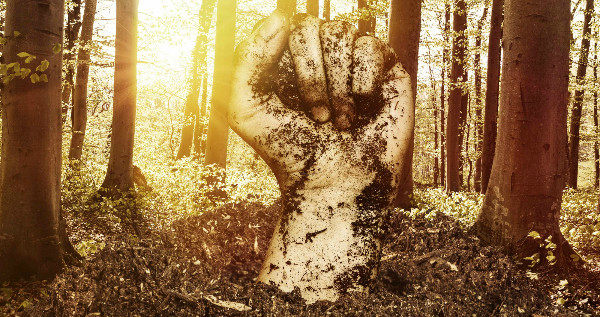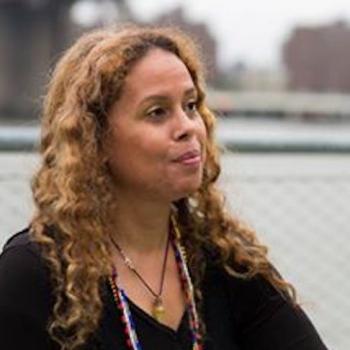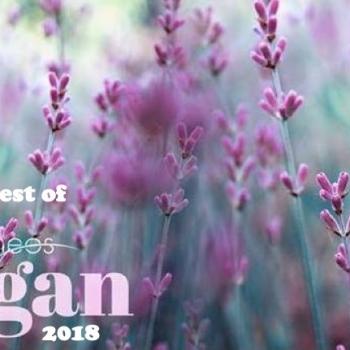On the day of the recent Charleston shootings, I participated in a discussion group on “Spirituality and Social Justice”, which 8 people attended, including the organizers. It was powerful and an important first step, but one of the things we asked is- why were there so few of us there? Historical social movements have often had a spiritual community at their core, so why haven’t Pagan groups become driving forces for activism? What holds us back and how do we change this? The following are some of the things that were brought up in the meeting and my own further thoughts on the topic.

Why Don’t Pagans Organize for Social Change?
We’re not an “organized” religion. Where an organized religion has doctrine and “thou shalt”s, Paganism is open to a nearly infinite variety of interpretations. While I believe that, in reality, each individual of any faith actually has a unique set of beliefs from anyone else in their group, organized religions do have documents that specifically state some of what it means to belong to that faith. As a result, members of organized religions tend to think of themselves as believing the same thing and are more likely to get wholeheartedly involved in something that their religious community proposes. Activism, in such communities, then becomes a way of expressing one’s own spirituality and membership in that faith. This can be reinforced by sermons quoting scripture that can be interpreted as supporting the proposed form of action. This has been successfully demonstrated by the positive work of such leaders as Dr. King.
Of course, Pagans in general recognize that there are significant downsides to organized religion- in fact, this is a reason many people become Pagan in the first place. Doctrine and rules that are set in stone (thousands of years ago, no less), can have negative results that range from being stifling of individuality to outright oppression and violence against those who vary from the group’s interpretation of scripture. The traits that make it easy to organize believers into a protest group also make it easy to turn them into a fundamentalist mob throwing stones. From a social justice perspective, organized religion is a double-edged sword that can be used for good or ill, depending on how it’s wielded.
To continue the metaphor, Pagans as a group tend to forgo using that sword at all, to avoid being cut by it. We are each free to follow our own path, which makes it more difficult to organize us into any one direction. This means a leader telling us what we “must” do in order to be “real” Pagans is not going to work. In general, we believe this is a good thing. It makes social action harder, as each individual has to choose that direction on their own, but it does not make it impossible.
Neo paganismis seen as a “white” thing. While there are numerous spiritual traditions all over the world that fall under the Pagan umbrella, the common perception of Paganism often links it to the Greek, Celtic and Norse pantheons, or to the occult practices of Victorian England. This is not an accurate representation of the diversity of Pagan belief systems, but it is the face most recognized by outsiders and new members to the faith. This last part is significant, as a person might be drawn to Paganism in order to reclaim a heritage of their ancestors that was lost (for example) to Christianity. A person with European heritage just finding out about modern Paganism would barely have to scratch the surface of public opinion to find something that would parallel the faith of their ancestors. Unless they already had prior knowledge of non-European Pagan paths, a person of color would have to actually study the diversity of Pagan belief systems before recognizing a commonality shared with their own ancestry. This results in a demographic that is not only seen as “white”, but in many cases actually is so in the majority.
One direction this can lead is in the marginalization or outright exclusion of people of color in some Pagan communities. Although this does not apply to any of the Pagan gatherings I have personally attended, I have heard of groups that are nearly fundamental in their recreationism- to the point where having Norse ancestors, for example, is seen as a requirement for participation. I have read about “Pagan” groups that are no more than an occult version of Nazism, and use their nominal faith to justify the oppression of people of color. While this blatant racism is not a trait of most Pagan groups, it is important for us to recognize that it does exist, and that just being Pagan does not make us immune to it.
On the other hand, belonging to a Pagan group that is (actually, or perceived to be) mostly “white” can create a completely different, but more complicated situation. Most Pagans are somewhat liberal and have some idea that racism is a bad thing. They may want to distance themselves from the history of white privilege and may feel drawn to non-European traditions for inspiration. Cultural appropriation is a complicated issue in the world at large, but becomes more so within the context of Pagan belief systems, where it is wide-spread. How do you approach the issue of cultural appropriation with a person who believes they were non-white in previous lives? In the eclectic umbrella of Paganism, how do we avoid appropriation without segregating ourselves based on ancestry (as mentioned in the prior paragraph)? Is it possible to be eclectic or syncretic without appropriating? This is perhaps the most complex issue in Paganism, and solving it will require ongoing discussions that include and highlight the perspectives of practicing Pagans of color.
The most direct effect, though, of the “whiteness” of Pagan groups is caused by white privilege. Though an individual’s place in the kyriarchy means that they are likely oppressed in some ways and privileged in others, an effect of being a white person in a mostly white group is that you are not required to notice issues of racial oppression. The fact that it is possible to honestly not know about current issues of social justice (or what to do about them) is a stumbling block in the way of efforts to organize Pagans for social change.
People (including Pagans) use religion as an escape from the real world. Karl Marx once said that “religion is the opium of the people” and Pagans are not exempt from this phenomenon. Many people have difficulties in their lives and want their spiritual practice to be a time when “all that” goes away and they can feel good and hopeful about the world. New Age ideas about positive thinking, or the Wiccan Rule of Three, can be over-extended and lead to the assumption that everything will be alright if we just keep calm and pleasant amongst ourselves.
But this point of view ignores the fact that there is real injustice in the world that we can do something about. To overcome this complacency, a variety of strategies are needed to make issues out in the world spiritually relevant to members of Pagan communities.
How Do We Get Pagans Involved in Social Change?
1) Information as opportunity- offer social justice training as a workshop for personal development- like we do for Tarot or Reiki. Include codified ways of responding to uncomfortable situations.
2) Activism as a defense against fundamentalism- as a Pagan thing. “Coming out” as Pagan can be synonymous with acknowledging one’s spirituality out in the real world, and including real world issues in one’s spiritual practice.
3) PR image shift- we need to publicize more non-European paths to let people of color know they have a stake in Paganism as well
4) Publicly condemn groups that use Paganism as a cover for white supremacy.
5) Have workshops and discussion groups specifically about cultural appropriation and Paganism. It may be helpful for groups to write a set of recommendations to avoid appropriation.
6) Make it personal- Just as Christian groups have the opportunity to “testify”, so should we express our truth to our communities. This would allow people who have been disenfranchised to bring up the issue and be heard by their community. It would also allow the others of the group to understand that the issue is not only “out there” but a real part of the lives of people they know. Perhaps “testifiers” could also have the option of saying how the community can help- anything from “I just want to be heard” to “Come to this protest with me on Saturday.”
7) Connect activism to common Pagan beliefs, for example:
a) Shadow Work: Many Pagans believe that light and dark are equal aspects of life and that both must be recognized and dealt with. Framing the “light” as what we want to be or have (deosil) and the “shadow” as the things that need to change (widdershins) can provide a way to include issues of injustice in regular spiritual practice and gatherings. Workshops based specifically on what is in our shadows and how to bring them to light could connect well to activism.
b) Interconnectedness: Many Pagans believe that on a spiritual level we are all one and what affects someone else affects us spiritually as well. Guided exercises exploring our connection to each other and to issues in the world could make Pagans more willing to participate in “political” action.
c) Intention and Ritual: Invite community members to participate in the creation of spell work and/or public rituals that broadcast the intention to make needed changes in the world, and any necessary changes in ourselves.
d) Cleansing: Many Pagans believe in cleansing oneself (and one’s tools, etc.) of past experiences or conditions that might impede progress before starting on a new endeavor. We can include our own biases and blindnesses in this cleansing.
e) Moon Phases: Many Pagans believe that the waning and dark moon are times to get rid of negative elements, while the waxing and full moons are times to focus on creating positive ones. Actual problems in the world can be included in waning moon ceremonies.
________
 Cam Franklin is a philosopher who identifies as Pantheist in theology and Pagan in spiritual expression. Like many Pagans, she was an adult before realizing there was a word (or several words) for what she believed. She is a proponent of the view that spiritual and ethical insights naturally lead to compatible perspectives about events and issues in the mundane world, and that the ability to make a difference is intrinsically linked with a moral obligation to do so. For this reason, support for issues like marriage equality, environmental protection, racial and economic justice, and strategic non-violence are inseparable from her faith. She currently lives in Northern California with her husband and two cats.
Cam Franklin is a philosopher who identifies as Pantheist in theology and Pagan in spiritual expression. Like many Pagans, she was an adult before realizing there was a word (or several words) for what she believed. She is a proponent of the view that spiritual and ethical insights naturally lead to compatible perspectives about events and issues in the mundane world, and that the ability to make a difference is intrinsically linked with a moral obligation to do so. For this reason, support for issues like marriage equality, environmental protection, racial and economic justice, and strategic non-violence are inseparable from her faith. She currently lives in Northern California with her husband and two cats.













